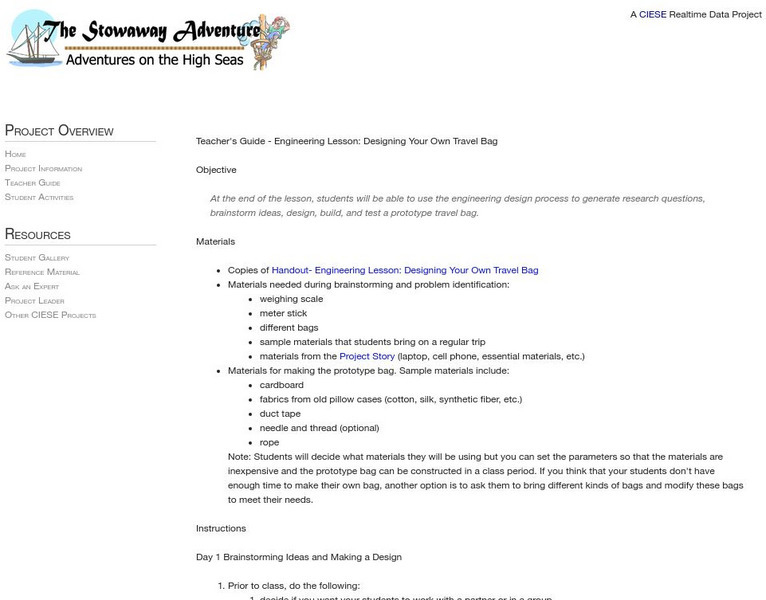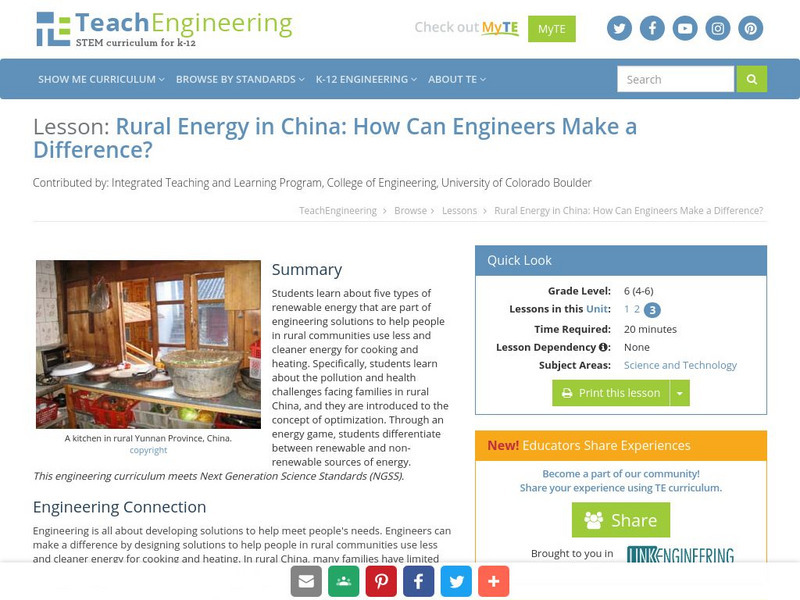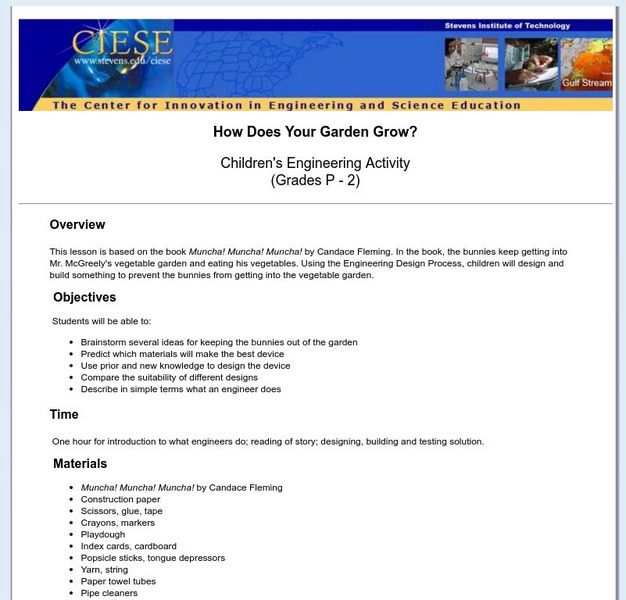TryEngineering
Try Engineering: Engineering Air Traffic
Young scholars work in teams to explore how radar and computer technology is used to provide the necessary data to air traffic controllers. Students become "engineers" as they work to find ways to enhance the current air traffic control...
TryEngineering
Try Engineering: Engineered Music
Object of this instructional activity is to learn about the engineering design of musical instruments. Students work in teams to design and build their own "tunable" and unique instrument using everyday materials.
Better Lesson
Better Lesson: Those Darn Squirrels! Brainstorming Ideas
A silly read-aloud captures the attention of students who must jump right into action applying the engineering design process in an effort to stop the squirrels from eating the birdseed. To complete the brainstorming students will work...
Center for Innovation in Engineering and Science Education, Stevens Institute of Technology
Ciese: The Stowaway Adventure: Engineering Lesson: Designing Your Own Travel Bag
After listening to the presented scenario, students are asked to design, create, and test a prototype of a bag that can carry their belongings and meet certain criteria.
Other
American Society for Engineering Education: E Gfi: Lesson: Made to Sail
Students use simple materials to design and make model sailboats that must stay upright and sail straight in a testing tank.
TryEngineering
Ieee: Try Engineering: Build Your Own Robot Arm
Students design and build a working robotic arm from a set of everyday items with a goal of having the arm be able to pick up a Styrofoam cup. Working in teams of three or four students, the students explore effective teamwork skills...
TryEngineering
Try Engineering: Blast Off
Hands on activity where students focus on aerospace engineering to investigate space flight from the viewpoint of an engineer. They design, build, and launch their rocket, then share their experiences with the class.
TeachEngineering
Teach Engineering: Latex and Hybrids: What's the Connection?
An engineering challenge where young scholars create small-scale models from which their testing results could be generalized to large-scale latex tubing for a hydraulic accumulator. They brainstorm ideas about how latex can be used in a...
TryEngineering
Try Engineering: Water Rocket Launch
The main focus of this lesson is learning about aerospace engineering and the principles of rocketry. To accomplish this, students will work in teams to design, build, and launch a rocket made out of a soda bottle, then present their...
TryEngineering
Try Engineering: Measuring the Wind
Students explore the design of anemometers and how they are used in measuring the speed of wind. Working in teams of "engineers", they will design, build, and evaluate the effectiveness of their own anemometers, presenting their findings...
TryEngineering
Try Engineering: Oil Spill Solutions
In a lesson to teach young scholars about the field of environmental engineering, they examine an oil spill, then design a system to contain the oil and extract it from the water.
TeachEngineering
Teach Engineering: The Three Color Mystery
Students are introduced to an engineering challenge in which they are given a job assignment to separate three types of apples. However, they are unable to see the color differences between the apples, and as a result, they must think as...
TeachEngineering
Teach Engineering: Engineering Brainstorming
Students act as an engineering consulting firm with the task to design and sell their idea for a new vehicle power system. During the brainstorming activity (Generate Ideas), students determine and comprehend what type of information is...
TeachEngineering
Teach Engineering: Rural Energy in China: How Can Engineers Make a Difference?
Young scholars learn about five types of renewable energy that are part of engineering solutions to help people in rural communities use less and cleaner energy for cooking and heating. Specifically, students learn about the pollution...
Other
American Society for Engineering Education: E Gfi: Build a Big Wheel
In this activity, teams of students learn about the history and engineering behind big wheels (Ferris wheels) by constructing a working model using pasta, glue, and teabags.
TeachEngineering
Teach Engineering: The Crash Scene
Fifth graders are introduced to the (hypothetical) scenario in which they are a team of EnviroTech engineers returning to the U.S. from a conference in Brasilia, Brazil. When their plane crashes deep in the Amazon forest, they work in...
TryEngineering
Try Engineering: Assembly Line
The core of this instructional activity is about the power of mass production. Students will first assemble a product individually, then work in teams to design, build, test, and redesign an assembly line whose product must meet quality...
TryEngineering
Try Engineering: Making Sense of Sensors
Lesson explore sensors focusing on ones that measure humidity. Students work in teams to design, build, test, and evaluate a hygrometer which was made out of everyday materials to measure humidity levels.
The Tech Interactive
The Tech Interactive: Tech Tip: Data Collection: Reflecting on Your Design [Pdf]
This resource explains why data collection is a great way to make informed improvements to a design, and how to do it. Data can be quantitative - such as a measurement of distance or time - or qualitative, such as an observation of...
Other
American Society for Engineering Education: E Gfi: Activity: Keep a Cube
In this activity, student teams in grades K-6 explore the design process by engineering a way to keep an ice cube from melting for 30 minutes. [6:00]
TeachEngineering
Teach Engineering: Cleaning Up With Decomposers
Students investigate decomposers and the role of decomposers in maintaining the flow of nutrients in an environment. Students also learn how engineers use decomposers to help clean up wastes in a process known as bioremediation. This...
Center for Innovation in Engineering and Science Education, Stevens Institute of Technology
Ciese: How Does Your Garden Grow?
Based on the book Muncha! Muncha! Muncha! by Candace Fleming. Students must use the engineering design process to plan and build a barrier that will keep hungry bunnies out of a garden.
Center for Innovation in Engineering and Science Education, Stevens Institute of Technology
Ciese: Scratch My Back
Starting with the book Big Smelly Bear by Britta Teckentrup, students use the engineering design process to design a solution to the bear's problem of not being able to scratch an itchy back.
Center for Innovation in Engineering and Science Education, Stevens Institute of Technology
Ciese: The Three Little Pigs
Students are asked to use the engineering design process to construct a house for the third pig in The Three Little Pigs story that can withstand the huffing and puffing of the wolf.














